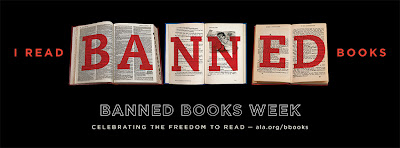
Welcome to Banned Books Week, which ends today, but can be celebrated all of the time – not celebrating that books are banned to punish thought crime, but to read something we might not otherwise read – to expand our awareness of what other people think – to be independent.
Some politicians claim that censorship is wrong, while using the government to prevent citizens from reading unapproved books. These politicians claim that they are protecting citizens from harm, because those citizens are students and too young to think for themselves in the schools that are supposed to teach these students to think for themselves.
The book banning politicians do not want the students to grow up to be voters who think for themselves, but want to control the information that is allowed to students, so that when they are adults, these citizens will do as they are told without questioning what they are told.
This is not new. Banning books has been around for hundreds of years and has always failed.
What is it about Toni Morrison that must be kept from students?
In 1616 the Catholic Church banned Galileo from even thinking about the Copernican hypothesis, because the Copernican hypothesis is a thought crime. In 1632 Galileo took a creative approach to the ban. Galileo wrote a dialogue discussing the superiority of the geocentric system and the heliocentric system, in spite of the evidence.
The evidence that the Earth does not move was that, if the Earth moved, we would feel it and we would be able to observe stellar parallax (when a star is viewed from one extreme of the Earth’s orbit to another, it will appear to have moved). These are common sense arguments, but common sense also tells us that the Earth is flat.
The evidence that must be ignored centered on a book written by Copernicus in 1543, later work by Johannes Kepler, and on evidence produced by Galileo with his telescopes beginning in 1609. Galileo had not invented the telescope, but had improved on it so much that he had the best telescopes in the world at that time. Using the telescope Galileo was able to show that the Earth was not the center of everything in the universe, since the moons of Jupiter revolve around Jupiter, not Earth. The existence and movement of Sun spots supported the Copernican system. The strongest argument was that Venus has phases, just like our Moon, but not consistent with revolution around Earth. Galileo was wrong about the tides, and should have known that he was wrong, but that was not an essential part of heliocentric theory.
After being threatened with torture and execution 69 year old Galileo recanted what he wrote and was sentenced to house arrest for the rest of his life. Giordano Bruno had been tortured for 7 years before being burned alive in public as an example to those who would think for themselves. Bruno was convicted of the same charge as Galileo – Heresy, which is thought crime.
The Church banned On the Revolutions of the Celestial Spheres by Copernicus (unless edited to mean the opposite of what Copernicus meant), and the books of Galileo, Kepler, and other books that provide evidence that the Earth revolves around the Sun. Some of those prohibitions lasted until 1835.
Only 45 years after the death of Galileo, long before there was evidence of stellar parallax, Isaac Newton ignored the prohibition on thought crime in his explanation of gravity. The theory of gravity requires the Earth to revolve around the Sun. If someone can show that the Sun revolves around the Earth, they can disprove gravity. Those who ban books would be ecstatic.
In 1992 Pope John Paul II gave a partial apology for the actions of the Church to punish thought crimes, but was criticized for going too far. The Catholic Education Resource Center still promotes disingenuous arguments to support the actions of the Church. Ironically, the Catholic Church does not oppose evolution (perhaps because their treatment of Galileo was so pathetically bad), but some Protestants, especially Evangelicals, do. Maybe they view evolution denial as their chance to grab their own science denial award – a Darwin Award, given to people who kill themselves through extreme stupidity.
In history, there are also books that are banned, because the evidence presented in the books may make the reader feel bad. This is not out of concern that the reader will feel bad about being lied to by their parents, teachers, and politicians. This is of a desire to protect the lies told by parents, teachers, and politicians.
The American Civil War was started by parts of America deciding to take all of their people and their land and all of the federal government land in their states and declare themselves a separate country, in order to protect slavery from the not yet elected Abraham Lincoln. This was when the Republicans were the radical progressive party and the Democrats were the unapologetic white supremacist party promoting slavery.
The dishonest historical claim is that the Civil War was fought over states’ rights, but before the war the slave states insisted that the Fugitive Slave Act be enforced everywhere in America, even though it completely violated the rights of the states that prohibited slavery. Why would they lie about something that is so easy to show to be false? Because if you are taught that thinking is a crime, you won’t check the facts. If you do check the facts, you are easier to target as a thought criminal.
Another example of the dishonesty of the claim that the Civil War was not fought to expand Christian slavery. Christian slavery does not mean slavery of Christians, although some did convert enslaved people, but slavery by Christians. Christians were the first people to enslave people based on the color of their skin. Slavery has been around probably as long as people have been around, but it was only when Europeans started exploring other parts of the world, that the business of slavery of people for looking different became established. Greece, Rome, the Ottoman Empire, . . . had slavery, but they did not have the racial slavery that Christianity created in the Age of Exploration, justified by the Bible.
Article I, Sec. 9, “(4) No bill of attainder, ex post facto law, or law denying or impairing the right of property in negro slaves shall be passed.” – Constitution of the Confederate States; March 11, 1861
Article IV, Sec. 3, “(3) The Confederate States may acquire new territory; and Congress shall have power to legislate and provide governments for the inhabitants of all territory belonging to the Confederate States, lying without the limits of the several Sates; and may permit them, at such times, and in such manner as it may by law provide, to form States to be admitted into the Confederacy. In all such territory the institution of negro slavery, as it now exists in the Confederate States, shall be recognized and protected be Congress and by the Territorial government; and the inhabitants of the several Confederate States and Territories shall have the right to take to such Territory any slaves lawfully held by them in any of the States or Territories of the Confederate States.” – Constitution of the Confederate States; March 11, 1861
The states also give their reasons for their insurrection:
A Declaration of the Immediate Causes which Induce and Justify the Secession of the State of Mississippi from the Federal Union.
“In the momentous step which our State has taken of dissolving its connection with the government of which we so long formed a part, it is but just that we should declare the prominent reasons which have induced our course.
Our position is thoroughly identified with the institution of slavery– the greatest material interest of the world.”
“We affirm that these ends for which this Government was instituted have been defeated, and the Government itself has been made destructive of them by the action of the non-slaveholding States. Those States have assume the right of deciding upon the propriety of our domestic institutions; and have denied the rights of property established in fifteen of the States and recognized by the Constitution; they have denounced as sinful the institution of slavery; they have permitted open establishment among them of societies, whose avowed object is to disturb the peace and to eloign the property of the citizens of other States. They have encouraged and assisted thousands of our slaves to leave their homes; and those who remain, have been incited by emissaries, books and pictures to servile insurrection.
For twenty-five years this agitation has been steadily increasing, until it has now secured to its aid the power of the common Government. Observing the forms of the Constitution, a sectional party has found within that Article establishing the Executive Department, the means of subverting the Constitution itself. A geographical line has been drawn across the Union, and all the States north of that line have united in the election of a man to the high office of President of the United States, whose opinions and purposes are hostile to slavery. He is to be entrusted with the administration of the common Government, because he has declared that that “Government cannot endure permanently half slave, half free,” and that the public mind must rest in the belief that slavery is in the course of ultimate extinction.
This sectional combination for the submersion of the Constitution, has been aided in some of the States by elevating to citizenship, persons who, by the supreme law of the land, are incapable of becoming citizens; and their votes have been used to inaugurate a new policy, hostile to the South, and destructive of its beliefs and safety.
On the 4th day of March next, this party will take possession of the Government. It has announced that the South shall be excluded from the common territory, that the judicial tribunals shall be made sectional, and that a war must be waged against slavery until it shall cease throughout the United States.”
Most of the Confederate states declared that they were not American before Lincoln was president. South Carolina, in the statement of their reasons does not sound much different from those claiming that Obama was going to close all of the churches and take everyone’s guns. President Obama never tried to do either one, in spite of the promises of his enemies. That is one of the reasons for banning books – to keep people from knowing the truth.
As with the memory holes in 1984, “The Party told you to reject the evidence of your eyes and ears. It was their final, most essential command.” George Orwell condemned authoritarians on the left and on the right. An important part of that condemnation is the way they try to prevent citizens from having access to information, as we see in so many states with book bans.
.








Subscribe to RogueMedic.com